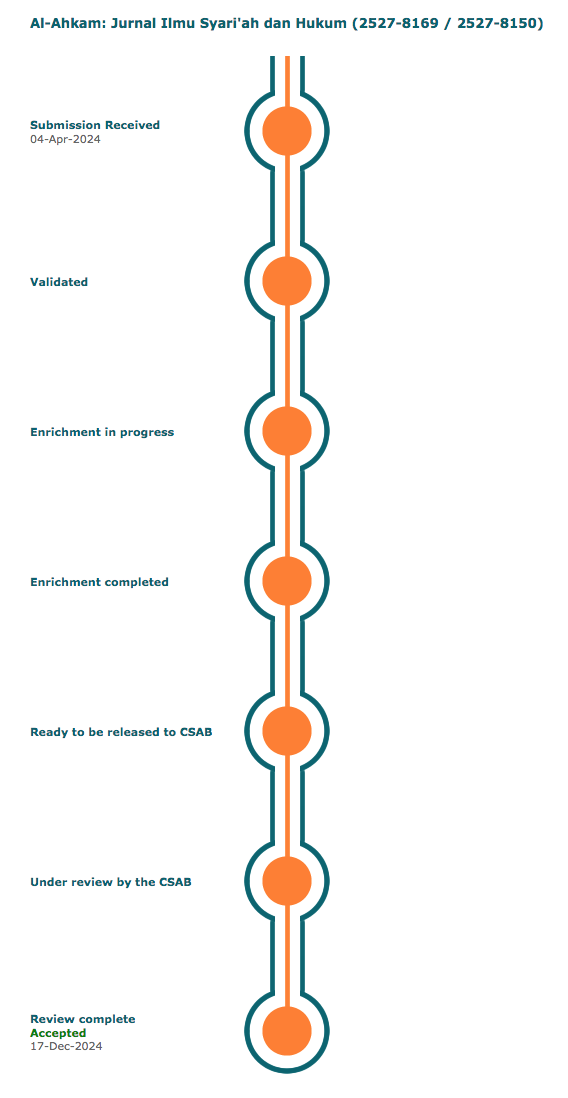The Relevance of the Concept of Justice in Islamic Law to Contemporary Humanitarian Issues
Downloads
This study explores the relevance of the concept of justice in Islamic law to complex and urgent contemporary humanitarian problems. Through the method of literature study with integrative and comprehensive literature analysis, this research conducts in-depth and structured investigations of existing literature to summarize and synthesize relevant views, arguments, findings, and thoughts. The results of the study stated that the concept of justice in Islamic law is a central aspect in Islamic religious teachings and has wide application in facing various humanitarian challenges today. Through a deep understanding of the concept of justice in Islamic law, societies can form solid moral views and act effectively to advance human rights, address economic disparities, facilitate peace, and respond to other humanitarian issues. This makes it possible to view the concept of justice in Islamic law not only as a religious aspect but also as a potential source of inspiration to build a more just and sustainable world for all humanity, whatever their religious or cultural background.
Downloads
Al Hamid, R., Sugitanata, A., & Karimullah, S. S. (2023). Sinkronisasi Pendekatan Sosiologis Dengan Penemuan Hukum Islam Sui Generis Kum Empiris. Bertuah Jurnal Syariah Dan Ekonomi Islam, 4(1), 48–60. https://doi.org/https://doi.org/10.56633/jsie.v4i1.553
An-Na’im, A. A. (2021). Islam, Islamic Law and the Dilemma of Cultural Legitimacy for Universal Human Rights 1. In Asian Perspectives on human rights (pp. 31–54). Routledge.
Askari, H., Mirakhor, A., Askari, H., & Mirakhor, A. (2020). Introduction and summary of the conception of justice in Islam. Conceptions of Justice from Islam to the Present, 1–16. https://doi.org/10.1007/978-3-030-16084-5_1
Baderin, M. A. (2003). International human rights and Islamic law. OUP Oxford.
Bejaković, P., Škare, M., & Družeta, R. P. (2021). Social exclusion and health inequalities in the time of COVID-19. Technological and Economic Development of Economy, 27(6), 1563–1581. https://doi.org/10.3846/tede.2021.16001
Emon, A. M., Ellis, M., & Glahn, B. (2012). Islamic Law and International Human Rights Law. OUP Oxford.
Faizin, M., Karimullah, S. S., Faizal, B. T. W., & Lubis, I. H. (2023). Development Of Zakat Distribution In The Disturbance Era. JURNAL ILMIAH MIZANI: Wacana Hukum, Ekonomi, Dan Keagamaan, 10(2), 186–197. https://doi.org/10.29300/mzn.v10i2.9721
Fauzia, A. (2017). Islamic Philanthropy in Indonesia: Modernization, Islamization, and Social Justice. Austrian Journal of South-East Asian Studies, 10(2), 223–237. https://doi.org/10.14764/10.ASEAS-2017.2-6
Feng, Y., Hu, J., Afshan, S., Irfan, M., Hu, M., & Abbas, S. (2023). Bridging resource disparities for sustainable development: A comparative analysis of resource-rich and resource-scarce countries. Resources Policy, 85, 103981. https://doi.org/10.1016/j.resourpol.2023.103981
Hakim, N. (2020). The Enforcement of Human Rights Through Implementing of The Sharia. Indonesian Journal of Education, Social Sciences and Research (IJESSR), 1(1), 1–9. https://doi.org/10.30596/ijessr.v1i1.4876
Jackson, L. (2014). ‘Won’t Somebody Think of the Children?’Emotions, child poverty, and post-humanitarian possibilities for social justice education. Educational Philosophy and Theory, 46(9), 1069–1081. https://doi.org/10.1080/00131857.2014.931430
Karimullah, S. S. (2023). For True Humanity: Harmonization of Islamic Law and Human Rights Towards Universal Justice. Matan: Journal of Islam and Muslim Society, 5(2), 40–56. https://doi.org/10.20884/1.matan.2023.5.2.9125
Karimullah, S. S., Faizin, M., & Islami, A. (2023). Internalization of Islamic Moderation Values in Building a Civilization of Love and Tolerance. Al-Insyiroh: Jurnal Studi Keislaman, 9(1), 94–125. https://doi.org/https://doi.org/10.35309/alinsyiroh.v9i1.6345
Lomborg, B. ırn. (2009). Global Crises, Global Solutions: Costs and Benefits. Cambridge University Press.
Manea, E. (2016). In the name of culture and religion: The political function of blasphemy in Islamic states. Islam and Christian–Muslim Relations, 27(1), 117–127. https://doi.org/10.1080/09596410.2015.1114241
March, A. F. (2010). Taking people as they are: Islam as a “Realistic Utopia” in the political theory of Sayyid Qutb. American Political Science Review, 104(1), 189–207. https://doi.org/10.1017/S000305541000002X
Muhajir, M., Nisa, I. S., Munawar, A., & Karimullah, S. S. (2023). Agus Moh Najib’s Thoughts on the Interconnection of Islamic Law and National Law. Jurnal Ilmiah Al-Syir’ah, 21(1), 86–103. https://doi.org/10.30984/jis.v21i1.2321
Mulder, F. (2020). Humanitarian data justice: A structural data justice lens on civic technologies in post‐earthquake Nepal. Journal of Contingencies and Crisis Management, 28(4), 432–445. https://doi.org/10.1111/1468-5973.12335
Owoyemi, M. Y. (2020). Zakat management: The crisis of confidence in zakat agencies and the legality of giving zakat directly to the poor. Journal of Islamic Accounting and Business Research, 11(2), 498–510. https://doi.org/10.1108/JIABR-07-2017-0097
R’boul, H. (2021). Alternative theorizing of multicultural education: an Islamic perspective on interculturality and social justice. Journal for Multicultural Education, 15(2), 213–224. https://doi.org/10.1108/JME-07-2020-0073
Saeed, A. (2018). Human Rights and Islam: An Introduction to Key Debates between Islamic law and International Human Rights Law. Edward Elgar Publishing.
Shah-Kazemi, R. (2006). Justice and remembrance: Introducing the spirituality of Imam Ali. Bloomsbury Publishing.
Sirait, S. (2022). The Concept of Justice in Islam According to Majid Khadduri. IJISH (International Journal of Islamic Studies and Humanities), 5(1), 42–62. https://doi.org/10.26555/ijish.v5i1.4896
Sugitanata, A., Karimullah, S. S., & Al Hamid, R. (2023). Hukum Positif dan Hukum Islam: Analisis Tata Cara Menemukan Hukum dalam Kacamata Hukum Positif dan Hukum Islam. JURISY: Jurnal Ilmiah Syariah, 3(1), 1–22. https://doi.org/10.37348/jurisy.v3i1.242
Copyright (c) 2023 Suud Sarim Karimullah

This work is licensed under a Creative Commons Attribution-ShareAlike 4.0 International License.







